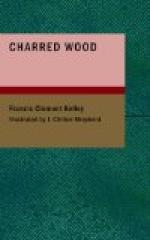“And so you do, Ann; so respect my wish in this. There, there, don’t cry. I don’t want to hurt you; but please don’t hurt me.”
“I’d cut me tongue out if it hurted yer Reverence.”
“I think you would. Indeed, I know you would. Don’t mind a spoiled dinner. There are plenty of dinners spoiled.”
“Sure, them that has theirs spoiled kin afford it.” Father Murray could not help being amused again. Ann was always bemoaning his slender revenues. “An’ ye a Vicar Gineral.”
“Never mind, Ann. I’ll get on somehow. Is there anything else?”
“McCarthy’s sick ag’in.”
“Well, I’ll take the Holy Oils and go down there this morning.”
Ann was now herself again, or she wouldn’t have come back so hard on the chronically dying McCarthy.
“Sure, ye n’adn’t do that. Ye’ve wasted a whole gallon of Holy Oil anointin’ that omadhan four times already.”
The priest passed off the unthought irreverence without notice.
“I’ll go and see him now, Ann. The man may be very sick. Get me my hat. I left it in my bedroom when I came in last night from O’Leary’s.”
Ann gave him his hat at the door, with another bit of information.
“Miss Atheson telephoned for me to ask ye to drop in to Killimaga on yer way back. Ye’ll be stayin’ fer lunch, as they call it?”
“Yes, I probably shall, Ann. It will save you a little work, and there are plenty of servants at Killimaga.”
He went down the walk to the street. Ann looked after him, the rebuke forgotten.
“Savin’ me work, is it? Faith, he ought to be thinkin’ of savin’ his pinnies, slashin’ thim around to the likes of McCarthy.” Then the remembrance of her spoiled tirade came to her, as she thought of her ruined dinner and the Bishop. “What did he do that fer to a man who was the Vicar Gineral? But God forgive me. An auld woman niver knows how to hauld her tongue. Sure, the Father is a saint anyhow, whativer the Bishop, bad scran to him, is.”
There was the eternal maternal in Ann, if nothing else was left of the eternal feminine. It is the eternal maternal that fights and hates, without knowing why—and loves and protects too—still without knowing, or asking, a reason.
In the kitchen Ann saw Uncle Mac taking his ease by the table. He often dropped in for a chat.
“Where’s the Father?” he asked.
“Gone to look over McCarthy ag’in,” she answered, with pleased anticipation of the things she could safely say, without rebuke, of the parish’s chronic hypochondriac.
But Uncle Mac, while he never rebuked, yet was adroit in warding off temptations to break the Commandments. He began to chuckle as if he had just heard a wonderful story.
Ann looked up. “What’s biting ye this mornin’?”
“’Tis what the Father said to Brinn, the man that runs the Weekly Herald. Ye know him?”




